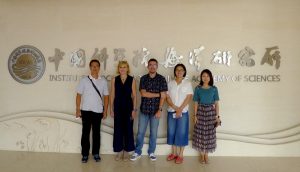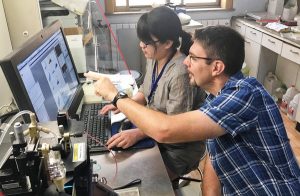Project on the microbial trophic network : functional dynamics at the single cell level (MITRONET)
2017-2019 Sino-French Cai Yuanpei* (蔡元培) Program
The project “Microbial trophic network : functional dynamics at the single cell level (MITRONET)” has been accepted for the next three years.
The two main partners of the project are the Mediterranean Institute of Oceanology (MIO) located in Marseille for the French side, and the Institute of Oceanography Chinese Academy od Sciences (IOCAS) located in Qingdao for the Chinese side. These two laboratories are collaborating since 2005, and are both interested in the microbial loop and marine ecosystem functioning.
The aim of the MITRONET project is to study the microbial food web (MFW) from viruses to ciliates following a systemic way using innovative approaches and developing new ones when necessary. ![]() To develop the flow cytometry detection of viruses in natural samples.
To develop the flow cytometry detection of viruses in natural samples. ![]() To develop the flow cytometry analysis of heterotrophic microorganisms in natural samples by using conventional instruments, as well as a new automated flow cytometer designed and under validation by the French team.
To develop the flow cytometry analysis of heterotrophic microorganisms in natural samples by using conventional instruments, as well as a new automated flow cytometer designed and under validation by the French team. ![]() To investigate the MFW structure in two contrasted sites, the Bays of Jiaozhou and Marseille, according to a new approach released recently by the Chinese partner and involving the contribution of the French partner (Chen et al., 2016).
To investigate the MFW structure in two contrasted sites, the Bays of Jiaozhou and Marseille, according to a new approach released recently by the Chinese partner and involving the contribution of the French partner (Chen et al., 2016). ![]() To quantify the dynamics of organic-matter transfer from the first trophic-network level towards higher trophic levels through predation by ciliates.
To quantify the dynamics of organic-matter transfer from the first trophic-network level towards higher trophic levels through predation by ciliates.![]() To study the temporal variability of phytoplankton and ciliate respiratory metabolism with various tools, among which a home-made device involving optodes, available at MIO.
To study the temporal variability of phytoplankton and ciliate respiratory metabolism with various tools, among which a home-made device involving optodes, available at MIO.
The ultimate goal, beyond the present project, is to estimate the amount of organic carbon that the first level of the microbial trophic network can transfer to higher levels, taking into account environmental conditions and the functional dynamics of the microbial food web at the single cell level.
The Cai Yuanpei Program was created jointly by the French Ministry of Foreign and European Affairs, the French Ministry of Higher Education and Research and the Chinese Ministry of Education, which has delegated the management of the program to the China Scholarship Council (CSC).
The MITRONET project has attracted the attention of the “Service pour la Science et la Technologie” of the French Embassy in Beijin, as demonstrated by the visit July 13th of her Attachée. Sophie de BENTZMANN is one of the Embassy Attachés for science and technology at the French Embassy in Beijing on secondment from the French Ministry of Research and High Education (MENESR) toward the French Ministry of Foreign Affairs and International Development (MAEDI).

Following the presentation of the collaboration between MIO and IOCAS, and the MITRONET Project, a visit of the IOCAS was made by the representatitives of the International Department of the Institute.
The flow cytometers of the IOCAS were also presented to de BENTZMANN. IOCAS is indeed equiped with several sorters, a last generation of analyser, and an automated flow cytometer. Gérald GREGORI introduced Sophie de BENTZMANN with the potential of this technology to better describe the microbial trophic network structure and better understand its functioning.

